As we grow older, we tend to forget, especially when we are stressed or overwhelmed by our tasks. At times, we have to multitask, taking care of the kids while cooking breakfast sometimes causing us to unintentionally forget that we were cooking. It is essential to be aware of what to do when your pan is on fire.
Watch the short clip below to learn how to safely put out a kitchen fire:
What causes your pan to catch fire?
Of course, we are only humans. Even the most skilled professional chef can make mistakes. Either we have a lot on our plate that we cannot multitask, or we unintentionally forget that we were actually cooking.
There are various reasons why this negative occurrence happens, but your reaction is the most crucial part.
Below is the list of the reasons why your pan catches fire.
- Your pan will probably catch fire when the cooking oil becomes scorching hot. Keep in mind that vegetable-based or organic cooking oils have 450 degrees Fahrenheit smoke point while animal oils or fats start to reach their smoking point at around 375 degrees Fahrenheit.
- our pan will also catch fire if you accidentally leave food that turned out burned. Do not leave the pan unattended. If this cannot be avoided, ensure that you reduce the heat temperature to avoid overcooked food that might eventually cause a fire.
- Your pan may also catch fire when you accidentally spill water or any alcoholic beverages on boiling oil. The reaction of boiling oil when in contact with water or alcohol is to ignite a fire automatically.
Do’s and Don’ts when your pan is on fire
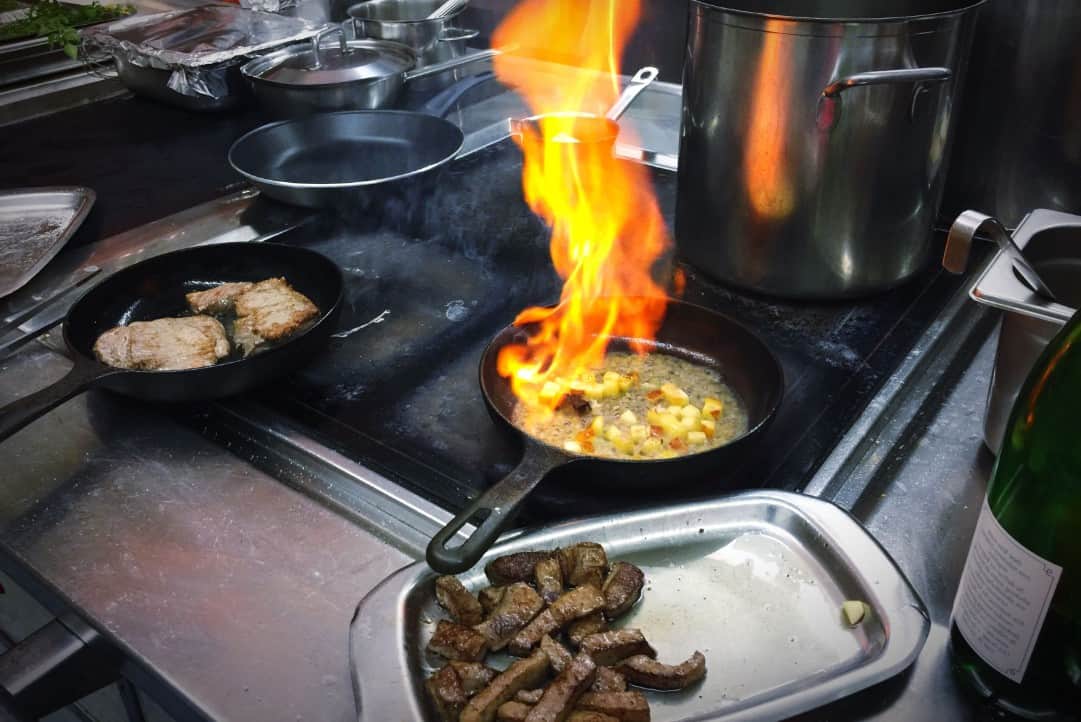
Though you get scared or even panic when there is a fire, always keep in mind that it will only cause more trouble if you let your emotions get the best of you.
Call for help when there is a fire because it is a severe emergency that needs to be attended to by professional firemen immediately.
However, it will take a while until they reach your destination. That is, if the fire is massive enough, that is already causing casualties. Therefore, it is essential that you know what you should and should not do when your pan is on fire.
7 Things to do when your pan is on fire
Understandably, you will panic when you see a fire, even if it just started, because it will spread out in a snap. One thing you know, your house is already burned down. But, we advise that you do not let it overwhelm you so that you can think straight.
First, turn off the heat
Take precautions when you go near the fire because you have to turn off the heat first. This is the most recommended initial action that you should take. Avoid trying to move the pan or pot somewhere else because it might cause more harm.
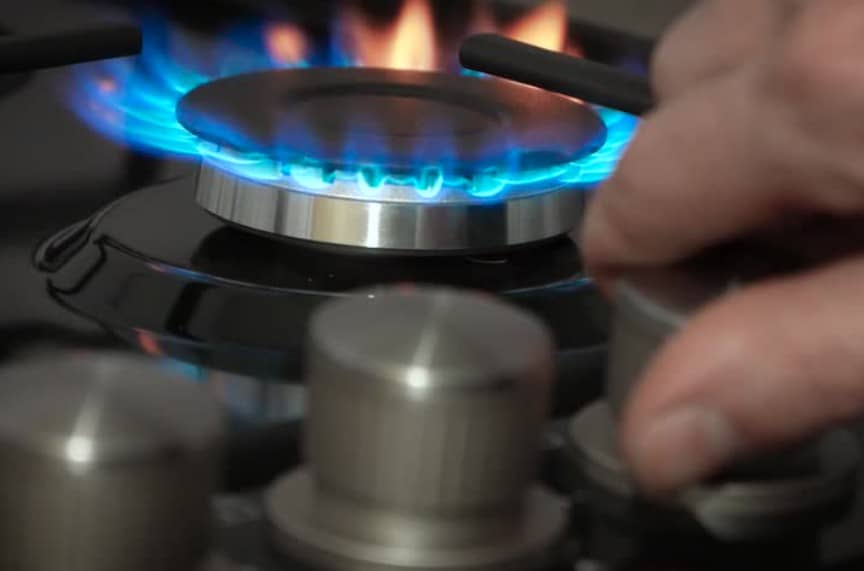
Immediately cover the pot
If the fire is not yet out of control, try preventing it from getting more prominent by placing a metal lid cover. With this, the fire will eventually die out because of the absence of oxygen. Make sure that the lid you use is metal because glass covers will shatter when exposed to extreme heat.
Spread a significant amount of baking soda
You can extinguish the fire by spreading a significant amount of baking soda, because sodium-bicarbonate has the natural ability to extinguish small fires.
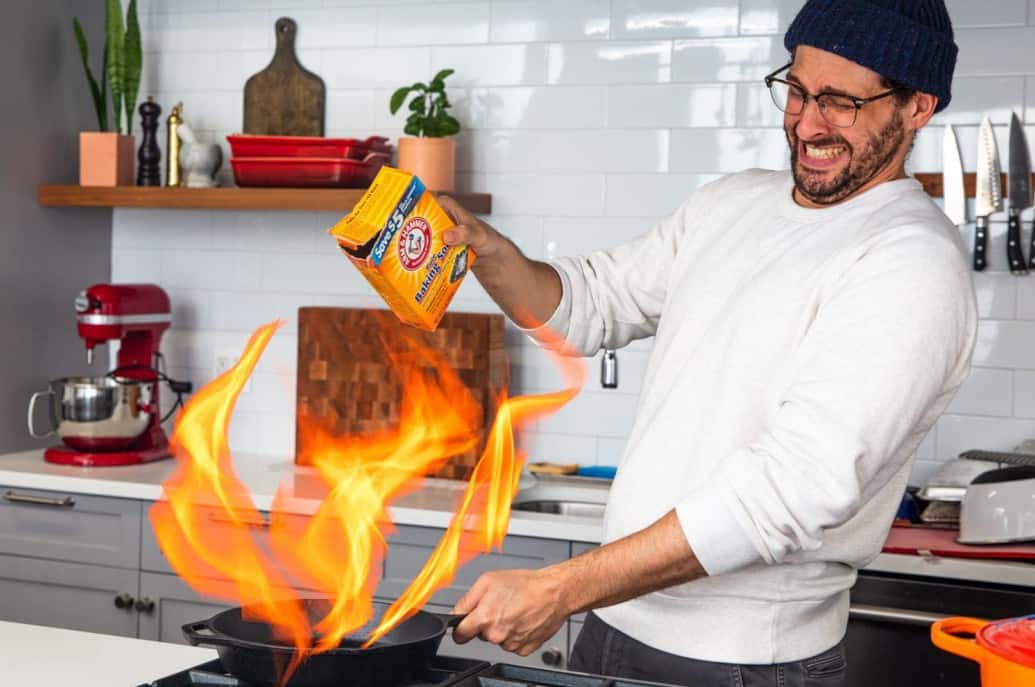
Shower with salt
Not everyone may be familiar with this trick, but it is also possible to seize a fire by directly pouring salt regardless of the fire size. Salt has the characteristic to quickly and naturally absorb the heat, which causes the fire to stop.
Ensure that you have a Fire Extinguisher
It is essential to have a suitable fire extinguisher accessible in case of an emergency– an emergency wherein the initial actions cannot even halt a fire from spreading out. Often, fire extinguishers are located in areas prone to large fires.
A fire extinguisher is used by spraying it at the base of the flame. If the fire cannot be stopped from spreading by turning off the stove, covering the pot, or even drenching it with baking soda, that is only the time you use a fire extinguisher.
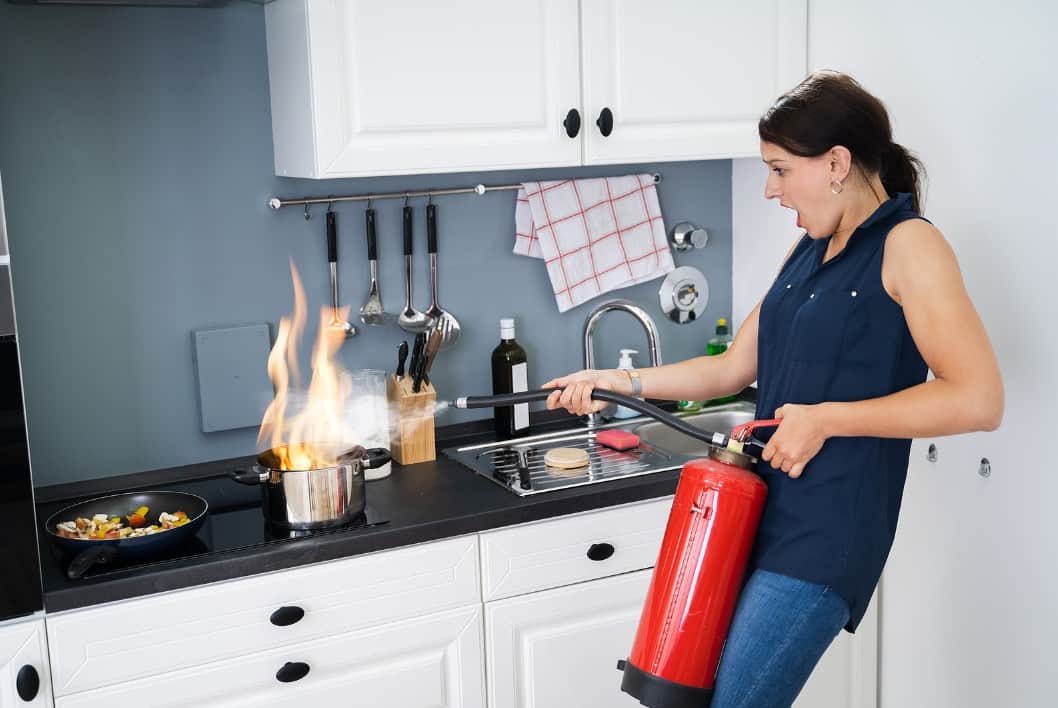
Make use of a thick cloth
You can simmer the fire by using a towel, a blanket, or any thick cloth. Even though these are made out of fabrics, they will not ignite a fire or even provoke it to become bigger. A huge cloth can also be used to cover you as you go through the walls with a burning fire that can burn you to death.
Call the emergency hotline
A fire naturally spreads fast like a virus. If you think that it cannot be prevented from spreading anymore, the best thing to do is call for help. Call the emergency hotline and the professionals to help and save you from harm.
4 Things not to do when your pan is on fire
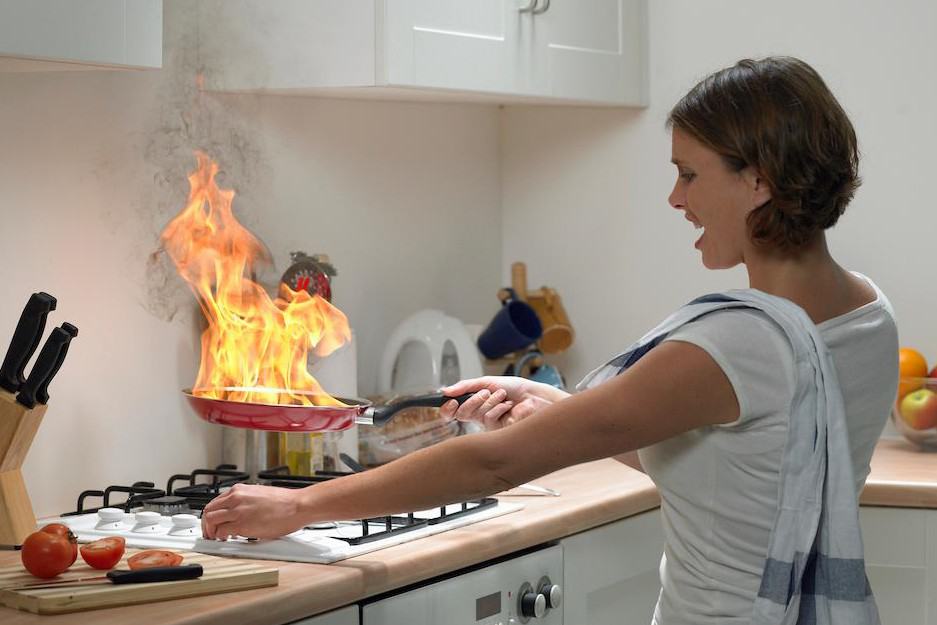
One mistake can affect your life, especially when emergencies like this. Therefore, avoid doing these things when your pan is on fire because a simple mistake can cause significant casualties.
Do not move the pan
Try killing the fire without lifting or moving the pan, as it can only cause severe damage with just one wrong move.
Do not splash water
We grew up thinking that water could always calm the fire, but that is not always the case. Avoid splashing water onto the pan that started to ignite the fire because that will eventually result in a fireball. The reaction of sizzling hot oil when in contact with water is different and sometimes may cause a larger fire.
Avoid using a fire extinguisher
Though you can use a fire extinguisher, it is only applicable to an extent where the fire is seriously large. If the fire has not yet spread out and it is still on the pan, avoid using the extinguisher because the force might only cause the fire to spread out.
Do not get panic
Out of all the things that you should not do, this is one thing you should always keep in mind. Avoid panicking because it will only cause more harm than help when you do.
6 Different types of fire extinguishers
Just like how you should do first-aid treatment when there is an accident, the same action goes for a fire. Thus, you need to take action and prevent the fire from spreading while you wait for the firemen.
Different types of fire extinguishers can temporarily help you stop the fire from spreading rapidly because not all types of fire extinguishers work on various fire classes.
So make sure that you have the right extinguisher in your area that is ideal for combating the potential fire hazards in your property.
Don’t know how to use a fire extinguisher? Learn how by watching the video clip below
ABC Powder Fire Extinguisher:
- Most common type of fire extinguisher
- Multipurpose
- Recommended to use in combating Class A, B, and C Fires
Carbon Dioxide or CO2 Fire Extinguisher:
- Considered to be the cleanest
- No residue and no need to be cleaned up after use
- Emits Carbon Dioxide / CO2
- Recommended to use in combating class B fire
Wet Chemical Fire Extinguisher:
- Has a solution that consists of potassium
- Sometimes effective in combating class A fires
- Specialized to combat Class K fire
Water Mist Fire Extinguisher:
- Can extinguish almost all classes of fire
- Releases fine water mist when used to combat the fire
- Water is being de-ionized
- Recommended to use in combating classes A, B, C, and K Fires
Foam Fire Extinguisher:
- Not advisable to use for gaseous fires
- Recommended to use for Class A and B’s flammable liquids
Clean Agent Fire Extinguisher:
- A kind of a gaseous fire suppression
- Liquid when stored but eventually converts into gas, a non-conductive gas
- Eco-friendly
- No residue, hence, does not require clean up
- Recommended to use in combating Class B and C Fires
5 Different Classes of Fire
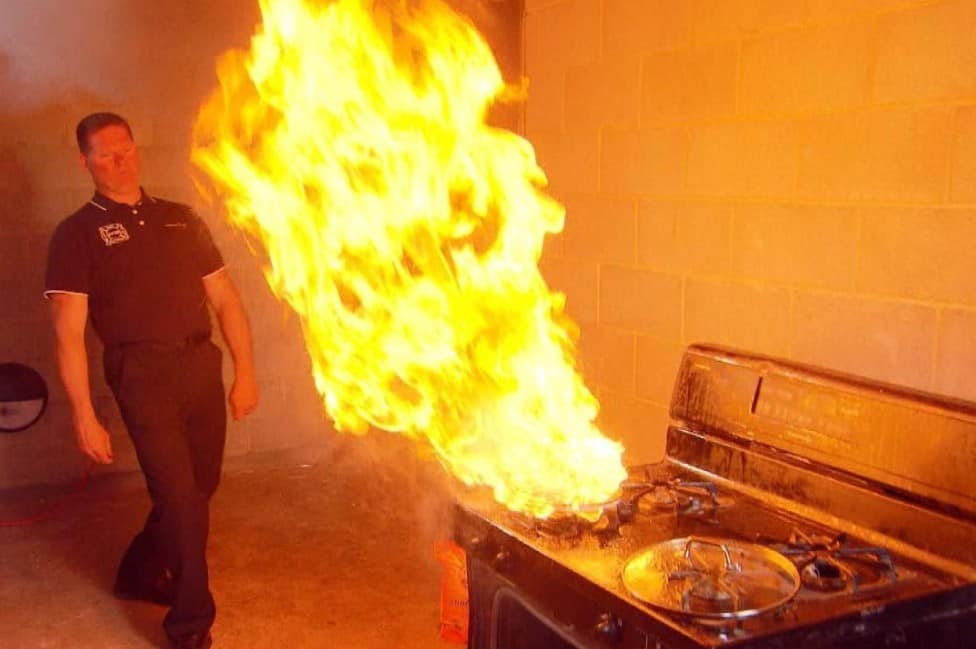
It is essential that you are also aware of the different fire classes because it will guide you on what type of fire extinguisher you should get. Therefore, it is a good idea to familiarize yourself with the 5 classes of fire.
| CLASSES OF FIRE | SCOPE |
| Class A | ● Wood ● Paper ● Items that are easily burned ● Solid Materials |
| Class B | ● Flammable Liquid ● Flammable Gas |
| Class C | ● Electrical Equipment ● Electrical Wiring ● Electrical Appliances |
| Class D | ● Metallic type of fire such as sodium, magnesium, |
| Class K | ● Technique to remember this class is the initial K which can also stand for Kitchen ● Cooking fires usually caused by meats, vegetable oils, and fats |
Summary
Now that you understand the causes and how to react when your pan is on fire, you can respond with confidence instead of panicking, knowing the right actions to prevent it from spreading like wildfire. Therefore, early prevention will also mean that the possibility of extreme casualties is at a lower rate.


Michael Johnson is the founder of Pan Mastery, Inspired by his blacksmith grandfather’s legacy has a deep appreciation for hand-crafted pots and pans, he provides invaluable guides, reviews, and recipes to enhance your culinary journey.
